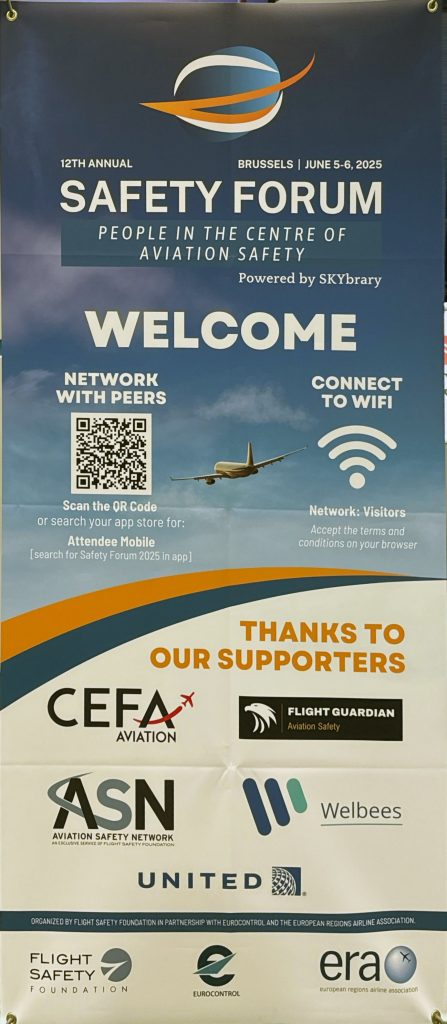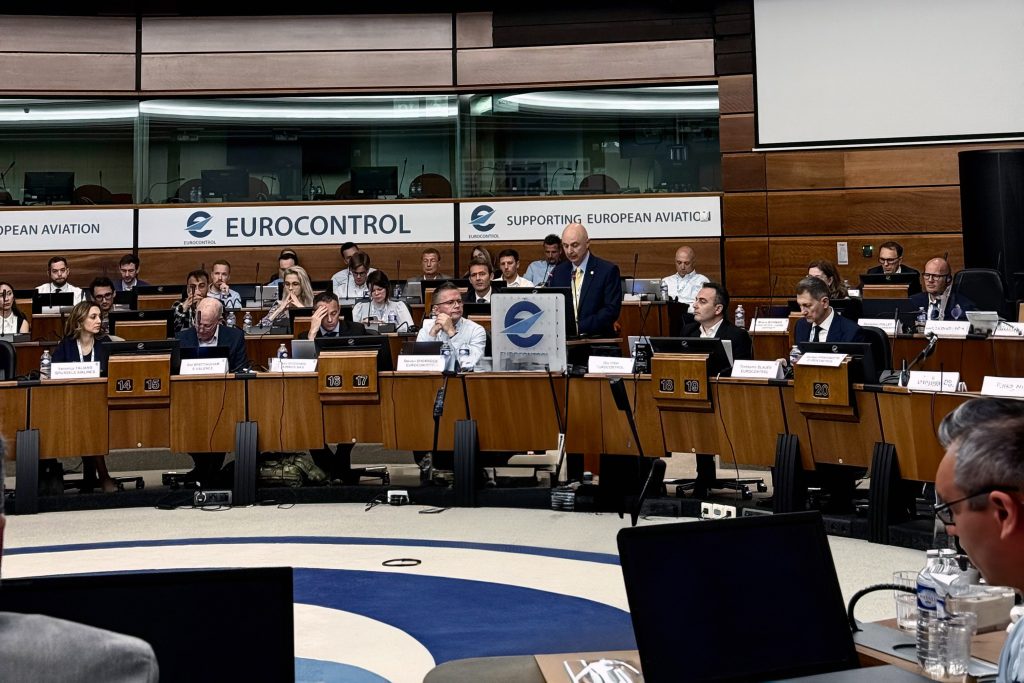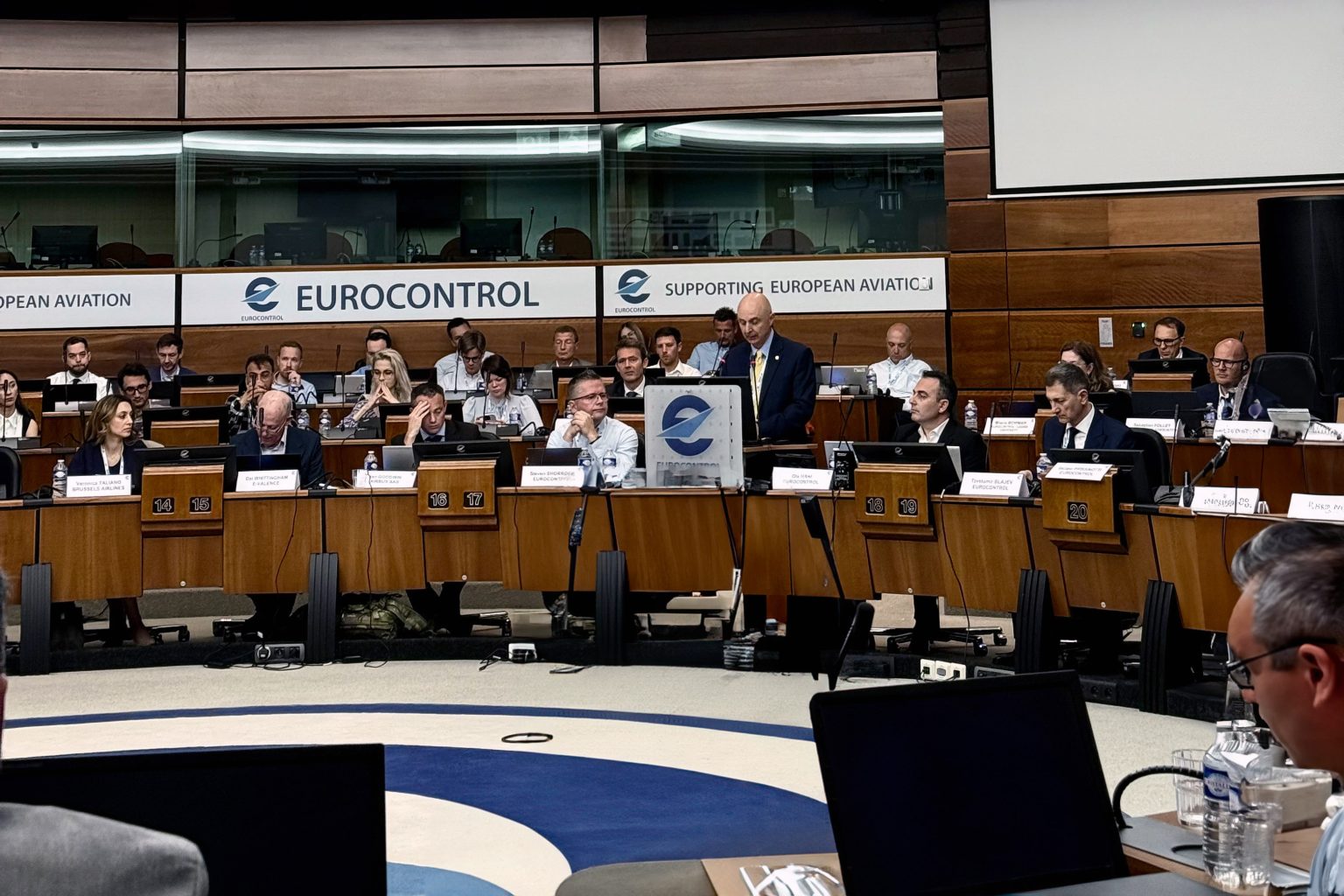Brussels, 5-6 June 2025

by Željko Oreški
IFATCA Mental Wellbeing Task Force stream lead
When I saw information about the 12th Safety Forum organised by Flight Safety Foundation, I was thrilled to see the following on the agenda: “Humans are the foundation of resilience in aviation, constantly adapting to the pressures of an increasingly complex industry. As these pressures grow, so does the need for resilience in the aviation system. The volume of civil aviation operations is expected to double within the next 20 years. With this growth will come technological advancements, innovative operations, and new entrants, all of which will contribute to an evolving and increasingly complex landscape. Additionally, aviation’s core objectives — safety, sustainability, and economic viability — are becoming increasingly interconnected, intensifying the complexity of the challenges the industry faces.”
The 12th Safety Forum took place on June 5–6, 2025, at EUROCONTROL headquarters in Brussels. The Flight Safety Foundation organised the Forum in collaboration with EUROCONTROL and the European Regions Airline Association. The theme of the 2025 Safety Forum was “People in the Centre of Aviation Safety”.
As a representative of IFATCA, I am involved in numerous projects related to human factors and well-being, including being a stream lead on the IFATCA Mental Well-being Task Force. It was logical and appropriate that my excellent mentor, Marc Baumgartner, and I applied to speak at such an event, as we are currently advocating to regulators worldwide for similar peer support programmes as those mandated for pilots in Europe, but for air traffic controllers. However, with over 80 submission applications, our presentation detailing what IFATCA has done and continues to do to prepare for a Mental Health initiative in Air Traffic Control (ATC) was not accepted. We aimed to discuss establishing evidence-based training programmes and educational initiatives for ATCOs on the vital topic of mental health within ATC.
Nevertheless, over 20 presenters from nearly all continents delivered 17 presentations during two busy days, led by excellent session chairs and hosts from the Flight Safety Foundation. After opening speeches from Tzvetomir Blajev (Operational safety coordinator at EUROCONTROL), Iacopo Prissinotti (Director Network management at EUROCONTROL), Jesper Rungholm (Capt./CEO HOS DAT) and Dr. Hassan Shahidi (President and CEO of the Flight Safety Foundation), we not only had the chance to listen to but also to see an alternative keynote speech in the form of a 24-minute video, a notable testimony from five individuals involved in major aviation accidents over the past decade, all prepared by Steven Shorrock. Our outstanding host throughout the event was Ian Goodwin, Director of Flight Safety Enhancement at Airbus.

There were six sessions over the two days:
Session 1: Setting the scene, moderated by Dai Whittingham, featuring three presenters. Milena Bowman from EUROCONTROL discussed mental health and the cost of exclusion, Sebastian Follet from DSAC talked about developing a just and fair culture in mental health, and Paul Reuter from the European Cockpit Association presented on positive organisational culture.
Session 2: Peer Support Networks, moderated by Veronica Taliano, included four presentations. David Morrissey, chairman of the Pilot Advisory Group at Aer Lingus, delivered a talk on the evolution of Pilot Peer Support in modern airlines. Rondeau Flynn, National Aeromedical Chairman of the Allied Pilots Association, and Peter Gillespie from the same organisation briefed us on pilot mental fitness. Captain Travis Ludwig, ALPA Pilot Assistance Chair of the Air Line Pilots Association (ALPA), discussed a comprehensive model for the physical and emotional well-being of frontline workers. Finally, Dave Fielding, Chair of the International Peer Assist Aviation Coalition, presented on mental health in aviation with an insightful and provocative perspective, referencing yoga and the benefits of a balanced diet, including vegetables.
In Session 3, moderated again by Veronica Taliano, we explored the topic of “Resilience Driving Aviation Safety”. Two speakers, Nuno Cebola, Director of Human Factors & Wellbeing at NATS, and Yann Duval, Safety Manager at ATR, discussed the resilience of front-line operators and a regional safety focus on this subject.
Maxime Wauters moderated the fourth session, titled “The Toolbox – Learning from Others.” Francois Brambati, Psychologist at Deep Blue Srl, presented on the mental incapacitation risk assessment process. Following this, Céline Soul, President, HOF Specialist, CC CRM Instructor, and Certified Sophrologist, along with Cabinet Angélia & Arnaud Morel, Sophrologist – FH Expert at SNCF, delivered one of the most engaging presentations about the organisation’s support for operators’ mental health. To conclude this session, Christina Nordentoft, Training Specialist at Naviair, joined us to discuss how to apply sport psychology techniques from elite sports to improve performance and mental health for ATCO trainees.
The middle of the second day began with session number five, once again moderated by Maxime Wauters. It focused on Mental Health Awareness. Three presentations were introduced by Gösta Centerwall, Captain, TRE, CRM, and Human Factors Trainer at Norwegian Air Shuttle, about what every professional needs to know about their brain. The second was by Cordula Pflaum, Training Captain for Airbus A330/A350/A380 at Lufthansa, on the impact of self-sufficient workgroups in the aviation industry. Finally, Herwin Bongers from Air New Zealand and Chris Finlayson, Executive Director of the Pilot Mental Health Campaign, spoke about building effective systems to address mental health assistance avoidance behaviours.
Finally, session 6 included two presentations. The first was by Janis Vegers, Senior Medical Expert at EASA, discussing the regulator’s role in aviation mental health and wellbeing. A trio gave the last presentation of the forum: Mark Searle, Global Director of Safety at IATA; Johanna Tikanmäki from Finnair; and Sasa Janine Leal Tennberg from Air Europa. They presented on fatigue safety performance indicators.
All videos and presentations are uploaded to the SKYbrary Aero website.
I learned some new words, at least to me, which I will explore further as a takeaway from this forum: the first one is presenteeism. Presenteeism refers to the situation where workers attend work despite being sick or tired, thereby affecting their productivity and work quality. It is a relatively new concept. First mentioned in a research paper in 1970 by Smith and Pittsburgh, a quick search on Google Scholar reveals approximately 250 articles published that mention the topic up until the year 2000. But over 3000 papers mentioning the subject in 2019 alone. Presenteeism at work leads to a reduction in productivity, lower-quality work, and an increased risk of developing health disorders. It is particularly high among groups that experience significant stress.
The second new concept is sophrology. Sophrology is a dynamic relaxation method developed by neuropsychiatrist Alfonso Caycedo, which includes physical and mental exercises to promote health and well-being. Emerging scientific studies suggest its potential benefits in various contexts, including stress reduction, anxiety management, and improved quality of life.
IFATCA will continue to be involved in mental wellbeing initiatives worldwide and will continue to advocate for the wellbeing of ATCOs, utilising best practices in our industry and developing ATM-specific initiatives.








